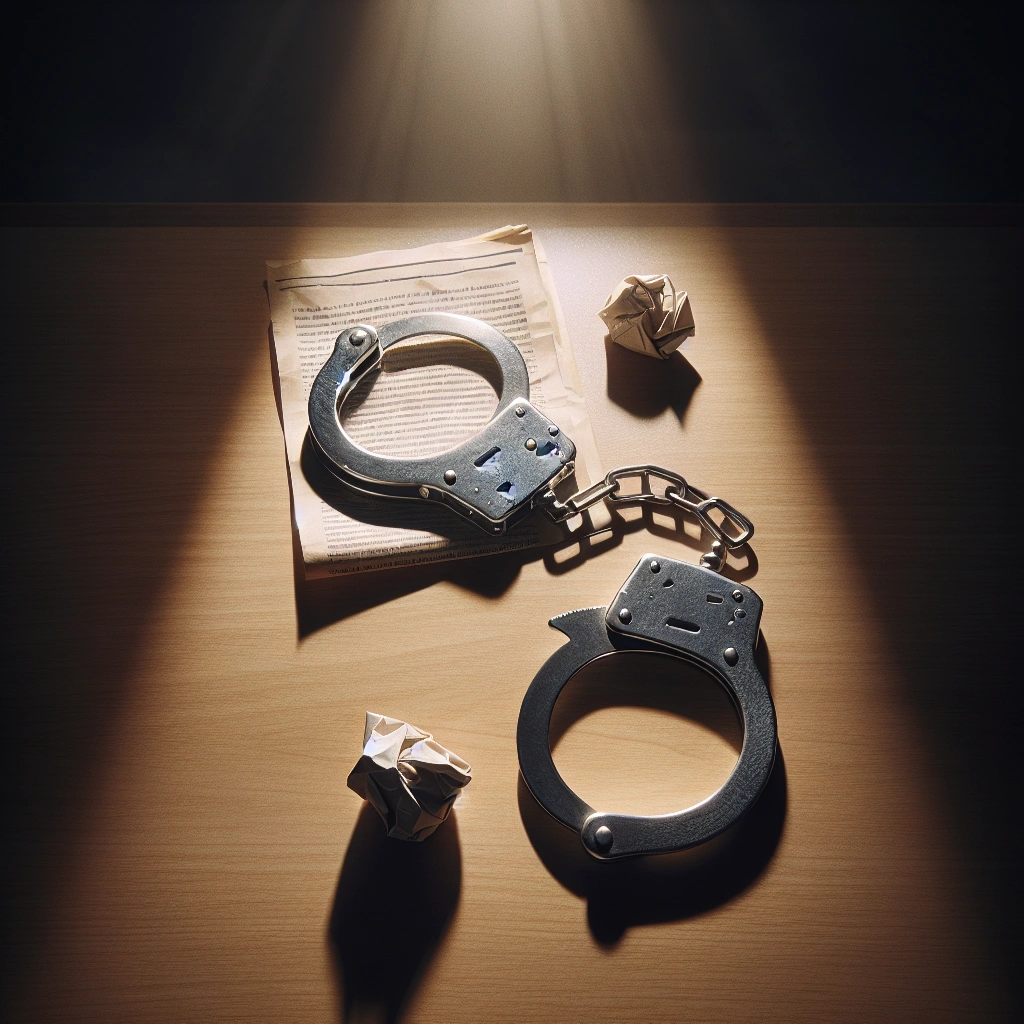Short Answer for What Happens if You Lie to the Police?
Lying to the police can result in severe legal consequences, including fines, jail time, or probation, because this act obstructs justice and violates laws against providing false information to law enforcement.
Imagine finding yourself in a situation where a single decision could alter the course of your life dramatically. Lying to the police-a choice that might seem like a quick fix or a way to dodge trouble-can actually lead down a path filled with dire consequences. This isn’t just about getting a slap on the wrist; we’re talking about heavy fines, possible jail time, or even probation.
When you provide false information to law enforcement, you’re not only complicating your life but also obstructing justice, a crime taken very seriously across all jurisdictions. The immediate outcomes can be harsh, involving substantial monetary penalties or incarceration, but the long-term effects on your reputation and credibility might be irreversible and even more punishing.
Facing such scenarios, it’s crucial to recognize the gravity of this act. Whether it’s through fines, jail, probation, or the stain on your personal record, the ripple effect of this decision extends far beyond the initial lie. Let’s delve deeper into what happens if you lie to the police, fully understanding the legal, social, and personal landscapes that will be irrevocably altered.
-
Facing fines: Lying to the police can result in substantial monetary penalties.
-
Jail sentence potential: Individuals may end up serving time behind bars for providing false information.
-
Probation is a possibility: Offenders might be placed under supervision, limiting their freedoms.
-
Perjury carries harsh penalties: If caught lying under oath, one faces serious legal repercussions, including significant prison time.
-
Damaged credibility and reputation: Lying to law enforcement can irreparably harm one’s standing in legal and social circles.

Is Lying to the Police a Crime?
Yes, lying to the police is indeed a crime. When individuals provide false information, make up stories, or give fake identities to law enforcement officers, they’re not only hindering investigations but also violating the law. These actions can lead to charges such as obstruction of justice or perjury, showcasing the legal system’s low tolerance for deceit in judicial processes.
Defining obstruction of justice and perjury within the context of law enforcement
Absolutely, folks. Let me tell you, when it comes to obstruction of justice, we’re talking about a serious matter. It’s like when you’re playing a game, and someone decides to move the goalposts. Not fair, right? Obstruction of justice occurs when someone, could be anyone, decides they’re going to throw a wrench into the workings of our law enforcement. This includes destroying evidence, making up stories, or anything that makes the job of our police harder. For example, obstruction of justice is like if you decided to eat the last slice of pizza and then told everyone it was already gone when they asked. Not cool.
Perjury, on the other hand, is when you’re sworn in, hand on the Bible, promising to tell the truth in court, and then decide to spin a yarn. This isn’t just any fib; it’s a felony. Picture it: you’re in a beautiful, big courtroom, the judge is looking majestic, and then someone decides to tell a whopper. That’s perjury for you. The court can’t function if people don’t stick to the truth. It’s like telling your golf buddies you hit an eagle on that par 5 when you really took a mulligan.
Real-life scenarios where misinformation led to criminal charges
Now, let’s get down to the nitty-gritty with some real zingers of stories where fibbing to the police landed people in hot water. Imagine someone decides to paint a picture for the cops, a real Picasso, except it’s all made up. One tale involved a person who thought it’d be a clever idea to report a fake crime. Talk about a waste of our fantastic police’s time! This led to charges of making a false report, and let me tell you, the judge wasn’t handing out slaps on the wrist.
Another genius decided they’d give the police a false name after getting arrested. It’s like saying you’re John Doe when we all know you’re more of a Joe Schmoe. This bright spark ended up with extra charges for giving false information to the police. It’s like adding extra toppings on a pizza you didn’t order; it just makes everything more complicated.
To wrap it up, telling fibs to those in blue isn’t just a naughty no-no; it can land you in a whole heap of trouble. Whether it’s obstruction of justice or perjury, the game’s not worth the candle. You might think you’re being clever, but remember, our police and courts are like chess masters; they’ll always think several moves ahead. So, do yourself a favor: stick to the truth, the whole truth, and nothing but the truth.

What Happens if You Lie to the Police?
Lying to the police can lead to severe consequences including substantial fines, a jail sentence, or probation, with the possibility of facing perjury charges if the falsehood is under oath. This misconduct significantly damages one’s credibility and personal reputation, affecting both legal standing and social opportunities. The penalties for lying to the police range from financial punishments and incarceration to long-term damage to one’s social and professional life.
Immediate consequences following the discovery of a falsehood
When you lie to the police, let me tell you, it’s not going to be a day at the beach. It’s going to be tough, really tough. First off, you could be slapped with fines. We’re talking about serious fines, not just chump change. Think about this, you could end up writing a check that makes your bank account weep. And that’s just for starters.
You might also be looking at a jail sentence. Can you imagine? Going from tweeting from your cozy couch to sharing a cell with someone who’s in for who-knows-what. It could happen if you decide to play fast and loose with the truth.
Then there’s probation. You think you’re free but guess again. You’ll have people checking up on you like you’re a teenager missing curfew. This whole scenario can quickly become a nightmare.
To give you an idea, making a false report under oath can land you in even hotter water. That’s right, we’re talking perjury. The hallmark of not being a great person. If the authorities catch you fibbing while you’re under oath, well, let’s just say the consequences get a whole lot grimmer.
Long-term impacts on legal proceedings and personal reputation
Now, folks, let’s talk about the long game. Lying to the police is the gift that keeps on giving, but not in a good way. Firstly, if you’ve got a case pending and you decide to sprinkle some fairy tales into your story, your credibility is out the window. Lawyers, judges, juries – nobody’s going to take you seriously. You’re basically shooting yourself in the foot, metaphorically speaking.
What’s more, once you’ve been tagged as someone who lies to the police, that’s a stain that doesn’t come out in the wash. Your personal reputation? Forget about it. It’s like trying to sell steak to a vegetarian – it’s not going to be received well. You could find doors slamming in your face, opportunities drying up faster than a puddle in the Sahara.
Let’s break it down even further with some numbers and facts:
| Consequences | Details |
|---|---|
| Fines | Could range from hundreds to thousands of dollars. |
| Jail Sentence | Ranging from a few days to several years. |
| Probation | Could last from one to three years, or even more. |
| Perjury Charges | Could lead to significant prison time. |
| Credibility & Reputation | Irreparably damaged, affecting legal & social standing. |
So, if you’re thinking about bending the truth the next time you’re chatting with the boys in blue, I’d reconsider. It’s not worth it, folks.
Believe ME.

What Are the Penalties for Lying to the Police?
Folks, listen up, and listen up good. When we’re talking about what happens if you lie to the police, believe me, it’s not pretty. It’s not like saying you have the best golf game when you really don’t. This is serious business. We’ve seen it time and time again, from the big cities to the small towns. Let’s dive into the details, and believe me, we’ve got the best details. Nobody does details better than us.
Comparative analysis of penalties across different jurisdictions
Now, depending on where you are – be it in the glamorous streets of New York or the sunny lanes of California – the penalties for trying to pull one over on the cops can vary, big time. For instance, in some places, telling a fib to the boys in blue might get you a slap on the wrist or a fine that’s less than a round of golf at Mar-a-Lago.
But in other jurisdictions, oh boy, you might be looking at some serious time behind bars. That’s jail time, folks.
And let me tell you, the food there? Not five-star.
| Jurisdiction | Penalty for Lying to the Police |
|---|---|
| New York | Up to 1 year in jail (Ouch!) |
| California | Fines and potentially 6 months in jail |
| Texas | Serious business: 2-10 years in prison |
| Florida | Fines and, yes, jail time |
Case studies highlighting sentences handed down for lying to law enforcement
Now, let’s spotlight some examples because, as we all know, examples are tremendous. They’re the best.
-
The Overly Ambitious Golfer: This guy, in Texas, told the police a tall tale about his clubs being stolen, hoping to collect insurance money to get himself a new set. Guess what? He ended up serving 2 years for insurance fraud and lying to the police.
-
The Case of the Missing Car in California: A lady reported her car stolen, hoping to get out of some hefty parking violations. When the police found her car parked outside her friend’s house, she faced fines and 6 months of probation. Not so smart, folks. Not smart.
-
Florida Man and the Imaginary Thief: A guy in Florida told the police someone broke into his house and stole his collection of exotic snakes. Turns out, he sold them to pay off debts. His sentence? 1 year in jail and a hefty fine.
-
New York’s Own Fibber: A woman told the NYPD her roommate threatened her with a dangerous weapon. Investigations revealed she made up the story because she wanted a new roommate. Her penalty? 3 months community service and a fine.
So, folks, the moral of the story is: don’t lie to the police. It’s a bad deal.
A really bad deal. You think you can outsmart them, but let me tell you, these guys are sharp.
They’re really sharp. And when they catch you – because they will catch you – the penalties are tough.
Very tough. We’re talking fines, probation, community service, or even jail time.
And believe me, nobody wants that. Nobody.
Remember, it’s always better to play it straight. Keep it honest, and you won’t find yourself in a situation that’s worse than a double bogey.
And that’s saying something, I can tell you. Believe ME.

Navigating the Legal Process After Being Accused of Lying
Navigating the legal process after being accused of lying involves several strategic steps. Initially, one must fully understand the charges, remain silent to avoid self-incrimination, and meticulously document all relevant interactions. It’s critical to seek a proficient criminal defense attorney, comply with all legal requirements, prepare the case thoroughly with your lawyer, and, if advised, prepare to testify effectively.
Steps to take if charged with providing false information
Being accused of providing false information, especially to law enforcement, is like being caught in a sand trap on one of my favorite golf courses – you didn’t intend to end up there, but now you’ve got to carefully get yourself out. First off, remember, staying calm is key, even though you might feel like you’re at a press conference surrounded by aggressive reporters.
Now, let’s break it down:
-
Understand the Charges: Just like understanding the rules of a great game, you need to grasp what you’re up against. False information charges can lead to serious penalties, including hefty fines or imprisonment. The U. S. Code clearly states it under 18 U. S. Code § 35 – Imparting or conveying false information.
-
Remain Silent: Anything you say can and will be used against you. This isn’t just a line from a TV show; it’s real life. Avoid discussing your case with anyone but your attorney. Think of it as not revealing your winning strategy before a critical negotiation.
-
Document Everything: Keep a detailed record of what happened, much like maintaining a ledger in business. Note down conversations, dates, times, and any relevant interactions that could help your case.
-
Seek Legal Advice: This step is crucial. Just as you wouldn’t go into a high-stakes business deal without an excellent advisor, you shouldn’t navigate these charges without a top-notch lawyer, specifically a criminal defense attorney. They know the game and how to play it to your best advantage.
-
Comply With All Legal Requirements and Court Dates: Think of these as mandatory board meetings. You wouldn’t miss them in the business world, so don’t miss them here. It’s part of your defense strategy.
Securing appropriate legal representation and preparing for court
Securing the right legal representation is like choosing the best candidate to run a company. It’s a decision that could define your future.
Here’s the game plan:
-
Research Your Options: Start with recommendations but also use resources like the American Bar Association to find attorneys specialized in defending against false accusations.
-
Interview Potential Lawyers: Think of it as hiring a CEO for your defense. Ask about their experience, strategy, and previous successes in similar cases. Your future could depend on their skills, so choose wisely.
-
Understand Their Fee Structure: Just as in business, transparency about costs is crucial. Know what you’re getting into financially to avoid surprises down the line.
-
Prepare Your Case Together: With your attorney, compile all evidence, including documents, communications, and witnesses that can corroborate your story. It’s like putting together a winning business proposal; everything needs to be in order.
-
Follow Your Attorney’s Advice: Once you’ve chosen your advocate, trust their guidance. They know how to navigate the legal system and will offer the best advice on how to proceed, much like a trusted advisor in the boardroom.
-
Prepare to Testify: If your lawyer advises you to testify, prepare meticulously. This is your chance to tell your side of the story, and like a keynote speech, preparation is key to delivering it convincingly.
Remember, being accused of lying to the police is a serious situation, but it’s not the end of the world. With the right strategy, a calm demeanor, and top-notch representation, you can navigate this process successfully.
It’s like turning around a failing business or winning a tough negotiation – with the right approach and team, you can come out on top.
| Step | Action | Details | Analogy |
|---|---|---|---|
| 1 | Understand the Charges | Know the specifics of being charged with providing false information including potential fines or imprisonment. | Understanding the rules of a game. |
| 2 | Remain Silent | Avoid talking about your case to anyone but your attorney to prevent self-incrimination. | Not revealing a winning strategy before a critical negotiation. |
| 3 | Document Everything | Keep a detailed record of all relevant interactions, dates, and times. | Maintaining a business ledger. |
| 4 | Seek Legal Advice | Find a qualified criminal defense attorney who can devise the best defense strategy. | Getting an excellent advisor for a high-stakes business deal. |
| 5 | Comply With Legal Requirements | Attend all court dates and follow legal advice as part of your defense strategy. | Attending mandatory board meetings. |
| 6 | Research Your Options | Look for an attorney with experience in defending against false accusations, using recommendations and the American Bar Association. | Choosing the best candidate to run a company. |
| 7 | Interview Potential Lawyers | Find the right attorney by asking about their experience, strategy, and case successes. | Hiring a CEO for your defense team. |
| 8 | Understand Fee Structure | Know the financial aspects of hiring your attorney to avoid surprises. | Ensuring transparency about costs in business. |
| 9 | Prepare Your Case Together | Compile evidence and witnesses that support your story with your attorney. | Putting together a winning business proposal. |
| 10 | Follow Your Attorney’s Advice | Trust in your attorney’s knowledge of the legal system and their advice on how to proceed. | Listening to a trusted advisor in the boardroom. |
| 11 | Prepare to Testify | If advised by your lawyer, ready yourself thoroughly to share your side of the story convincingly. | Preparing for a keynote speech. |

Conclusion
Lying to the police is a serious offense that can lead to obstruction of justice or perjury charges. When someone decides to mislead law enforcement, whether by destroying evidence, making up stories, or giving false information, they are directly hindering the legal process. This not only complicates the work of the police but can also result in fines, jail time, or probation for the individual.
Immediate consequences of lying to the police include significant fines and the possibility of a jail sentence. These penalties reflect the severity of attempting to manipulate legal outcomes and underscore the importance of honesty within the justice system. Being dishonest with law enforcement is not a minor misstep; it’s a decision that carries hefty immediate repercussions including potential perjury charges, especially if the falsehood is under oath.
In the long run, lying to the police can have detrimental effects on one’s credibility and reputation. Once marked as untrustworthy, individuals may face challenges in both legal proceedings and personal relationships. It’s crucial to understand that the consequences of such actions go beyond legal penalties, affecting one’s social standing and future opportunities. Here’s a brief summary:
| Consequences | Details |
|---|---|
| Fines | Could range from hundreds to thousands of dollars. |
| Jail Sentence | Ranging from a few days to several years. |
| Probation | Could last from one to three years, or even more. |
| Perjury Charges | Could lead to significant prison time. |
| Credibility & Reputation | Irreparably damaged, affecting legal & social standing. |
Remember, the ripple effects of lying to law enforcement extend far beyond the initial lie, making honesty the best policy when dealing with the police.
